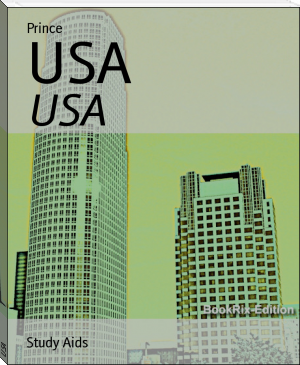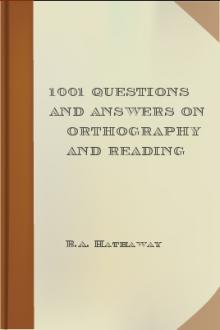Big Dummy's Guide To The Internet - Electronic Frontier Foundation (reading rainbow books .txt) 📗

- Author: Electronic Frontier Foundation
- Performer: 1428042873
Book online «Big Dummy's Guide To The Internet - Electronic Frontier Foundation (reading rainbow books .txt) 📗». Author Electronic Frontier Foundation
Connection closed by foreign host.
The middle line tells you the date and exact Mountain Standard
Time, as determined by a federal atomic clock.
TRANSPORTATION
The Subway Navigator in Paris can help you learn how long it will
take to get from point A to point B on subway systems around the world.
Telnet: metro.jussieu.fr 10000
No log-in is needed.
When you connect, you’ll be asked to choose a language in which to
search (you can choose English or French) and then a city to search.
You’ll be asked for the station you plan to leave from and the station
you want to get to.
WEATHER
The University of Michigan’s Department of Atmospheric, Oceanographic
and Space Sciences supplies weather forecasts for U.S. and foreign cities,
along with skiing and hurricane reports.
Telnet: madlab.sprl.umich.edu 3000 (note the 3000).
No log-in name is needed.
Also see under Weather in the FTP list for information on downloading
satellite and radar weather images.
6.4 TELNET BULLETIN-BOARD SYSTEMS
You might think that Usenet, with its hundreds of newsgroups,
would be enough to satisfy the most dedicated of online communicators.
But there are a number of “bulletin-board” and other systems that
provide even more conferences or other services, many not found
directly on the Net. Some are free; others charge for access. They
include:
Bookstacks Unlimited is a Cleveland bookstore that uses the Internet
to advertise its services. Its online system features not only a catalog,
however, but conferences on books and literature.
Telnet: books.com
Log in with your own name and select a password for future connections.
Cimarron. Run by the Instituto Technical in Monterey, Mexico,
this system has Spanish conferences, but English commands, as you can
see from this menu of available conferences:
List of Boards
Name Title
General Board general
Dudas Dudas de Cimarron
Comentarios Comentarios al SYSOP
Musica Para los afinados….....
Libros El sano arte de leer…..
Sistemas Sistemas Operativos en General.
Virus Su peor enemigo…...
Cultural Espacio Cultural de Cimarron
NeXT El Mundo de NeXT
Ciencias Solo apto para Nerds.
Inspiracion Para los Romanticos e Inspirados.
Deportes Discusiones Deportivas
To be able to write messages and gain access to files, you have
to leave a note to SYSOP with your name, address, occupation and phone
number. To do this, at any prompt, hit your M key and then enter,
which will bring up the mail system. Hitting H brings up a list of
commands and how to use them.
Telnet: bugs.mty.itesm.mx (8 p.m. to 10 a.m., Eastern time, only).
At the “login:” prompt, type
bbs
and hit enter.
Cleveland Free-Net. The first of a series of Free-nets, this
represents an ambitious attempt to bring the Net to the public.
Originally an in-hospital help network, it is now sponsored by Case
Western Reserve University, the city of Cleveland, the state of Ohio
and IBM. It uses simple menus, similar to those found on CompuServe,
but organized like a city:
<<< CLEVELAND FREE-NET DIRECTORY >>>
1 The Administration Building
2 The Post Office
3 Public Square
4 The Courthouse & Government Center
5 The Arts Building
6 Science and Technology Center
7 The Medical Arts Building
8 The Schoolhouse (Academy One)
9 The Community Center & Recreation Area
10 The Business and Industrial Park
11 The Library
12 University Circle
13 The Teleport
14 The Communications Center
15 NPTN/USA TODAY HEADLINE NEWS
h=Help, x=Exit Free-Net, “go help”=extended help
Your Choice ==>
The system has a vast and growing collection of public documents,
from copies of U.S. and Ohio Supreme Court decisions to the Magna
Carta and the U.S. Constitution. It links residents to various
government agencies and has daily stories from USA Today. Beyond
Usenet (found in the Teleport area), it has a large collection of
local conferences on everything from pets to politics. And yes, it’s
free!
Telnet: freenet-in-a.cwru.edu or
freenet-in-b.cwru.edu or
freenet-in-c.cwru.edu
When you connect to Free-Net, you can look around the system.
However, if you want to be able to post messages in its conferences or
use e-mail, you will have to apply in writing for an account.
Information on this is available when you connect.
DUBBS. This is a bulletin-board system in Delft in the
Netherlands. The conferences and files are mostly in Dutch, but the
help files and the system commands themselves are in English.
Telnet: tudrwa.tudelft.nl
ISCA BBS. Run by the Iowa Student Computer Association, it has
more than 100 conferences, including several in foreign languages.
After you register, hit K for a list of available conferences and then
J to join a particular conference (you have to type in the name of the
conference, not the number next to it). Hitting H brings up
information about commands.
Telnet bbs.isca.uiowa.edu
At the “login:” prompt, type
bbs
and hit enter.
Youngstown Free-Net. The people who created Cleveland Free-Net
sell their software for $1 to anybody willing to set up a similar
system. A number of cities now have their own Free-Nets, including
Youngstown, Ohio. Telnet: yfn.ysu.edu At the “login:” prompt, type
visitor
and hit enter.
6.5 PUTTING THE FINGER ON SOMEONE
Finger is a handy little program which lets you find out more about
people on the Net — and lets you tell others on the Net more about
yourself.
Finger uses the same concept as telnet or ftp. But it works with
only one file, called .plan (yes, with a period in front). This is a
text file an Internet user creates with a text editor in his home
directory. You can put your phone number in there, tell a little bit
about yourself, or write almost anything at all.
To finger somebody else’s .plan file, type this at the command
line:
finger email-address
where email-address is the person’s e-mail address. You’ll get back a
display that shows the last time the person was online, whether
they’ve gotten any new mail since that time and what, if anything, is
in their .plan file.
Some people and institutions have come up with creative uses for
these .plan files, letting you do everything from checking the weather
in Massachusetts to getting the latest baseball standings. Try
fingering these e-mail addresses:
weather@cirrus.mit.edu Latest National Weather Service weather
forecasts for regions in Massachusetts.
quake@geophys.washington.edu Locations and magnitudes of recent
earthquakes around the world.
jtchern@ocf.berkeley.edu Current major-league baseball standings and
results of the previous day’s games.
nasanews@space.mit.edu The day’s events at NASA.
coke@cs.cmu.edu See how many cans of each type of soda
are left in a particular soda machine
in the computer-science department of
Carnegie-Mellon University.
6.6 FINDING SOMEONE ON THE NET
So you have a friend and you want to find out if he has an Internet
account to which you can write? The quickest way may be to just pick up
the phone, call him and ask him. Although there are a variety of “white
pages” services available on the Internet, they are far from complete —
college students, users of commercial services such as CompuServe and
many Internet public-access sites, and many others simply won’t be
listed. Major e-mail providers are working on a universal directory
system, but that could be some time away.
In the meantime, a couple of “white pages” services might give you
some leads, or even just entertain you as you look up famous people or
long-lost acquaintances.
The whois directory provides names, e-mail and postal mail address
and often phone numbers for people listed in it. To use it, telnet to
internic.net
No log-on is needed. The quickest way to use it is to type
whois name
at the prompt, where “name” is the last name or organization name you’re
looking for.
Another service worth trying, especially since it seems to give
beginners fewer problems, is the Knowbot Information Service reachable by
telnet at
info.cnri.reston.va.us 185
Again, no log-on is needed. This service actually searches through a
variety of other “white pages” systems, including the user directory for
MCIMail. To look for somebody, type
query name
where “name” is the last name of the person you’re looking for. You can
get details of other commands by hitting a question mark at the prompt.
You can also use the knowbot system by e-mail. Start a message to
netaddress@info.cnri.reston.va.us
You can leave the “subject:” line blank. As your message, type
query name
for the simplest type of search. If you want details on more complex
searches, add another line:
man
Another way to search is via the Usenet name server. This is a
system at MIT that keeps track of the e-mail addresses of everybody who
posts a Usenet message that appears at MIT. It works by e-mail. Send a
message to
mail-server@rtfm.mit.edu
Leave the “subject:” line blank. As your message, write
send usenet-addresses/lastname
where “lastname” is the last name of the person you’re looking for.
6.7 WHEN THINGS GO WRONG
Nothing happens when you try to connect to a telnet site.The site could be down for maintenance or problems.
You get a “host unavailable” message. The telnet site is downfor some reason.
Try again later.
You get a “host unknown” message.Check your spelling of the site name.
You type in a password on a telnet site that requires one, andyou get a “login incorrect” message.
Try logging in again. If you get the message again, hit your
control and ] keys at the same time to disengage and return to your host
system.
You can’t seem to disconnect from a telnet site.Use control-] to disengage and return to your host system.
6.8 FYI
The Usenet newsgroups alt.internet.services and alt.bbs.internet
can provide pointers to new telnet systems. Scott Yanoff





Comments (0)